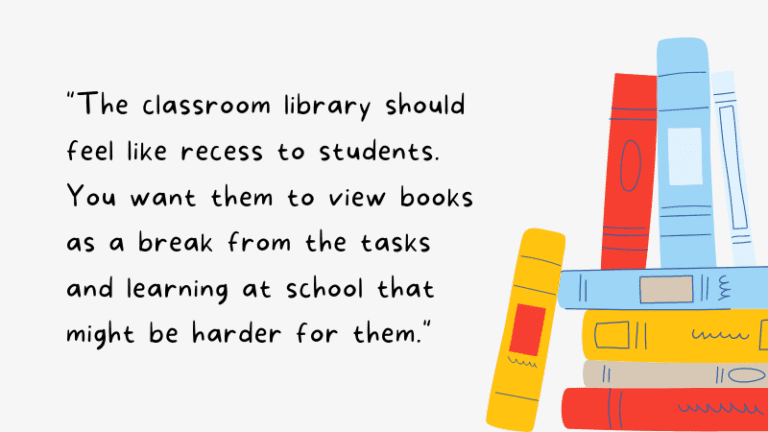I used to have a decent classroom library in my middle school classroom. A lot of my friends have older kids, and they’d pass on hand-me-down novels. I’d pick them up cheap at the library book sale, and I had a few coverless, dog-eared childhood favorites still hanging on. But the last few years, that bookshelf had become more of a headache than a help in my classroom, for several reasons.
It’s impossible to keep track of books.
I start the year off with a pretty good inventory, but by May it’s down to Little Women and a random Gabriel Garcia Marquez novel in Spanish that somebody donated. Every. Single. Year.
It doesn’t support choosing books in a way that works for all my students.
When I let kids pick their own books, it generally doesn’t go well. For my avid readers, it’s not a problem. Meanwhile, the ones who struggle do one of two things. They either get solely books that are easy for them, but below their level—I spend half the year saying “If you’re in seventh grade, you’re not going to enjoy a book with ‘kindergarten’ in the title!”—or they pick a big fat adult novel they can’t manage because they’re not planning to read it anyway.
[contextly_auto_sidebar]
It discourages real reading.
I did silent reading in my class for years, and every single class period the same thing happened. One or two kids would walk over to the classroom library, grab a book at random, flip to page 128, and stare into space for the next twelve minutes. I’ve taught kids who never finished a book in the entire school year. And, of course, they were the kids who most needed to read.
So this year, I scrapped my classroom library.
I gave books to other teachers, to students, to my kids’ friends. The ones that were beyond saving, I stuck in a box to use for blackout poetry when we have a slow day. Every sad, raggedy novel in my room—gone.
Then I got down to business with some purchase order forms. Luckily, my school paid for what I needed, but my backup plan was to use Donors Choose. Now, I have between five and ten copies of about 35 different books, at a variety of reading levels. I’ve got poetry and prose, fiction and nonfiction, fantasy and horror and romance.
By the end of the first week, each of my seventh graders had a book in their hand.
They filled out interest surveys; I did a reading assessment; they wrote in journals about who they like to work with and how they like to work. I used all that information to assign book circles and choose books. We had our first book circle meeting last Friday, and I knew it would either be a huge success or an unmitigated disaster.
I gave out 95 books and assigned a page number goal to each group for the week, somewhere between 40 and 70 pages, depending on the length of the book. (My goal was for all groups to finish in five weeks.) Four kids had barely started at the end of the first week. Eighteen made it within ten pages of their goal. Thirty-eight kids made it to their goal or shortly past it. And fifteen loved their book so much they were already finished.
Using book circles to replace independent reading in my class will take some tweaking, but I’d say it’s a success so far.
Kids carry their books everywhere with them, and they have actual conversations about them even when it’s not book circle day. For the kids who are behind, I’ve blocked in some time next week to sit down and read out loud to them; I’m convinced that if I can draw them into the story, they’ll start reading it on their own. After all, I picked really great books.
Maybe it’s just beginning-of-the-year optimism talking, but I think scrapping my classroom library was one of the best decisions I’ve made as a teacher. Hopefully, by the end of this year, every seventh grader at my school will be able to tell you all about their favorite book. And since I know which kid is reading which book, they’ll all make it back to my bookshelf so I can loan them out again next year.
We’d love to hear—would you ever consider getting rid of your classroom library? Come and share in our WeAreTeachers HELPLINE group on Facebook.
Plus, four rules I always forget to enforce.


